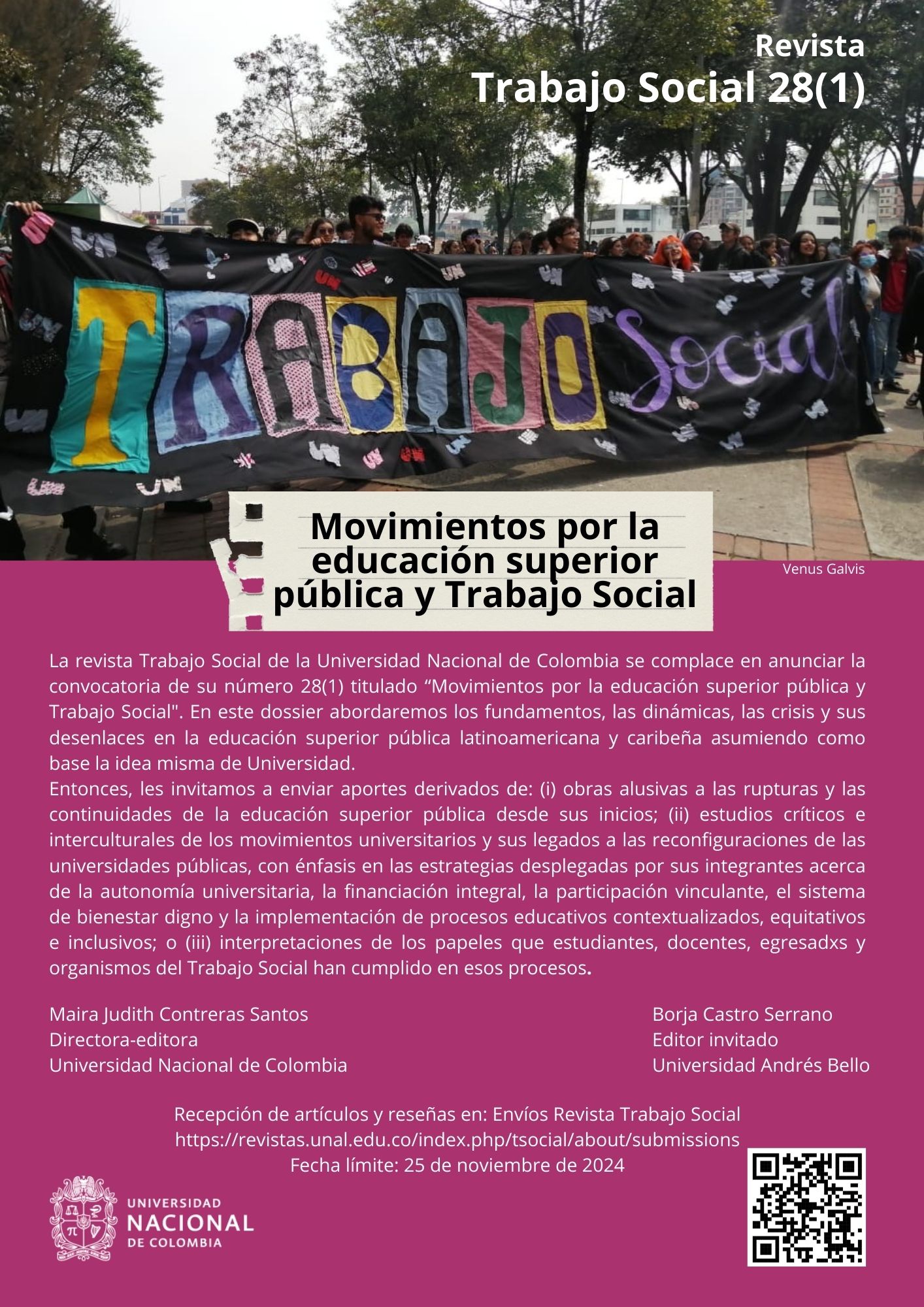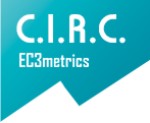New call for papers! Volume 27.1: Configurations of subjective and intersubjective links: contemporary challenges.

We invite you to send us your articles, reviews or interviews for the new issue of the journal Trabajo Social.
Social configurations of subjective and intersubjective links: contemporary challenges
Social Work as a discipline-profession is embedded in the complexities of human relationships. In particular, it explores the social configurations of subjective and intersubjective bonds to understand and address the challenges faced by individual, group, family, community, collective and social movements. In this work, it reveals diverse notions, trajectories, experiences, tensions and challenges.
For example, in terms of social configurations, it can refer to horizons of understandings about subjective ties that underline their contextual, dynamic and interdependent character. Therefore, in the foundations of such configurations, Social Work interprets their social, cultural, emotional, symbolic and material dimensions, as well as their historical and relational trajectories, overcoming approaches that are linked to individual psyches, dichotomous relationships or essentializing, naturalizing and homogenizing determinisms in their constructions (Elias, 1987).
In this way, Social Work recognizes the links as constitutive social forces of the structure of relationships, hierarchies, orders and social practices (Lipsett-Rivera, 1998), which address the integrating movements of the individual and the social, assuming the interdependencies, the wefts of meaning, the forms of interrelation, the interstices, the intermediate places of mixture, hybridity, liminality, tension, conflict and possibility in which a "we" is articulated with diverse practices of subjectivation and social action (Nussbaum, 2004, 15).
Hence, in this issue, we look forward to contributions to enhance research and interventions referring to the social configurations of subjective and intersubjective bonds through the following axes:
First, we are concerned with the construction, reproduction or transformation of individual identities and the roles played in them by subjective ties. Thus, we expect analyses on the influences of social, cultural and family factors in the formation of identities; the impacts and coping of traumatic experiences and social injustices on subjective developments, as well as the meanings and practices of agency and self-affirmation of the subjects in the construction of their subjectivities.
Secondly, we are interested in the construction of intersubjective bonds. Consequently, we expect critical reviews of the challenges concerning the relational dynamics of ties between subjects situated in particular historical trajectories. Specifically, studies alluding to the configurations of relational networks between diverse groups, generations, genders and social classes in whose dynamics emerge social practices, representations, imaginations of past, present and future, communications, coexistence, tensions, conflicts, daily agencies and collective mobilization actions. Likewise, works referred to the configurations of the dominant systems that produce exclusions, marginalizations, oppressions, stigmatizations and cancellations in intersubjective relations, as well as those present in the processes of social intervention.
Thirdly, we question ourselves about the historical transformations of family networks. Thus, we expect reflections on the diversity, complexity and singularity of their forms of existence, their arrangements and ways of living as a family; the relational logics of their exchanges between the private and public spheres; the intersections and transformations related to the patriarchal, colonial and adult-centered system manifested in family networks. Also, innovative analyses and approaches to private life, intimacy, everyday life, new rituals, domestic territories, collective family memories and the emergence of new orders in the social organization of care. At the same time, we aspire to publish research on the social problems that occur in these networks as a cause or effect of social transformations; the interconnections in contexts that affect families; the economic and social policies related to the phenomenon in question; the inequalities, exclusions, violence, armed conflicts, migrations and oppressions on these groups.
Fourthly, we are called by Social Work proposals in the field of mental and emotional health. Therefore, we expect analysis of the social, psychosocial and intersectional dimension of (inter)personal conflicts present in difficulties and disorders such as social anxiety and depression, among others. In addition, allusive assessments of sociotherapeutic strategies for the promotion of emotional and psychosocial well-being of individuals and collectives; understandings and support to individuals, groups and families in the presence of abuses and violence (structural, domestic, social, urban and political, based on gender, age, ethnicity and class) that occur in their lives; the resolutions of conflicts of multiple actors at scale and the knowledge of action related to the prevention and individual and intersubjective treatment of addictions and problematic consumption.
Fifthly, we identify that Social Work has had differential deployments in its individual, family and group case methods, being these dynamic and essential in professional intervention, focused on subjective and intersubjective well-being and social change. Therefore, we hope to have approaches concerning these deployments, their approaches, learning and tensions. Likewise, we look forward to receiving proposals that explore the roles of therapeutic and clinical approaches in individual, sociotherapeutic, group, family and crisis intervention approaches; professional support in situations of rupture of couples, families and neighbors or migratory events, displacement and conflicts; intersectional, differential and psychosocial approaches to racial discrimination; the fight against socio-cognitive injustice and the construction of daily peace in harmony with nature.
Maira Judith Contreras Santos
Director-Editor
Wilson Herney Mellizo Rojas
Guest Editor
Receipt of manuscripts
Until March 8, 2024
Submissions: https://revistas.unal.edu.co/index.php/tsocial/about/submissions


























